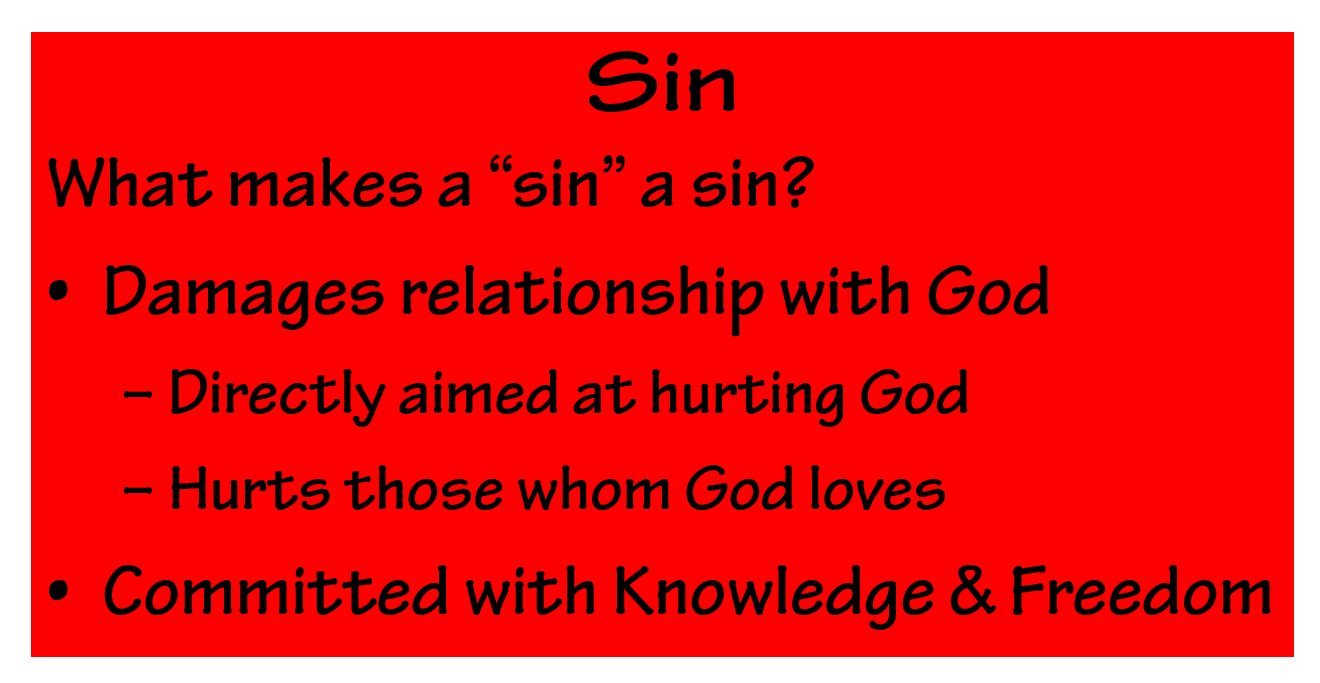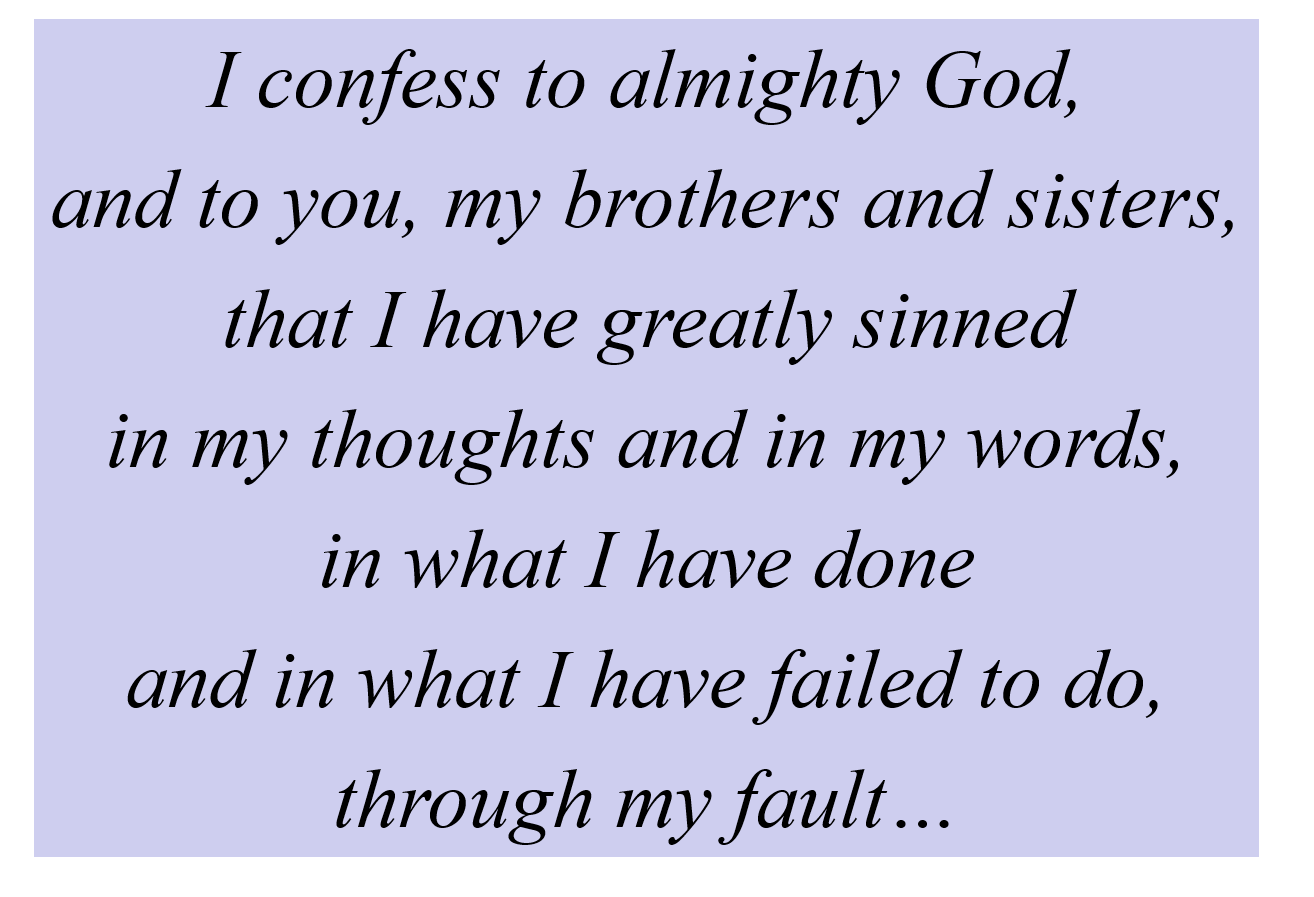Morality Part 5: What Makes a Sin a Sin
It was a Theology Q&A session on a retreat – a safe environment. Participants were encouraged to write down their questions on any faith-related topic and submit them anonymously. The group was encouraged to raise hands and ask additional questions if needed. This was their time. There were over 30 retreatants, plus the team; women ranging from their early 20’s to their early 80’s. When the topic of sin came up, you could feel the emotional intensity in the room. As each question was answered, seven more hands shot up asking more questions.
When people ask,“Is it a mortal sin if…”more often than not, they are asking out of fear. Somewhere along the line they learned that ___ was a mortal sin, and if you did [it], you were going to hell. Some ask the question while thinking about their own behavior; others ask out of concern for a loved one.
Struggling with the concept of sin–and the fear of hell that accompanies it–can really damage a person’s faith, which is why this post is so important.
In Morality Part 1, I explained that When we say something is a “sin” it’s because it damages our relationship with God; not because it is “breaking the rules.” It damages our relationship because it is either directly aimed at hurting God or at hurting those whom God loves. And as Morality Part 4 explained, it’s only a sin if you know what you’re doing is wrong and you are doing it of your own free will.



Catholic Tradition takes these concepts from Old Testament along with the words of Jesus in the Gospels and the writings of St. Paul to expand our understanding of sin.
In the Penitential Rite, we pray:

Notice how this prayer recognizes that sin is always committed with intent (through my fault…). Additionally, the words of this prayer acknowledge both the sins of commission (doing something wrong) and the sins of omission (not doing something that we know we should’ve done) – and this happens in thoughts, words, and actions. In all cases, we recognize that there are varying degrees of seriousness:

Venial sins include the smaller, less serious acts of sinfulness that often result from the bad habits or laziness. (I know I should pray, but I don’t. I know I shouldn’t swear, but I do.) These are important to recognize because over time they weaken our relationship with God.
As the degree of seriousness increases, Catholic Tradition describes mortal sin. Translated literally, this is a sin which brings a “deadly” or “mortal” blow to one’s relationship with God. A mortal sin is a complete, deliberate rejection of God. This is a big deal. We’re not just talking about any sin, here. We’re talking about a relationship-breaking sin. For it to be considered a “mortal sin” it:
- Must involve “grave matter“
- Must be done with full knowledge.
- Must be done deliberately, with full freedom.
It is difficult to broadly and definitively classify anything as a mortal sin because the only one who knows a person’s honest level of knowledge, freedom, and intent is God. For instance, consider one of the most disturbing “jobs” during the Holocaust. The Jewish Virtual Library explains that at Auschwitz and several other concentration camps,
Culpability, the degree to which people are morally responsible, can diminish if a sin is committed under duress, whether that pressure comes from oneself or others. Then there are psychological wounds, such as the PTSD of war veterans or mental illness, that likewise limit one’s freedom and diminish responsibility.
Is it possibly for a person to commit a mortal sin? Absolutely. That possibility is a reflection of the depth of our human freedom. However, not every decision is made with full knowledge, full freedom, and deliberate intent.
Moreover, you know what the remedy is for mortal sin? Reconciliation. Mess up really bad? Take responsibility, seek forgiveness, and make amends. God just wants us to repent and return to him.
Mortal sin is not the end. Rather, it points to a deep, serious need for reconciliation.
At this point in the Theology Q&A, someone inevitably asks:
- For forming our conscience and increasing our desire for good.
- For informing our conscience and developing our moral wisdom.
- For following our conscience and avoiding sin.
As I wrap up the series of posts on Morality, think about your own attitudes towards sin:
- When it comes to the topic of moral responsibility and sin, what do you struggle with?






